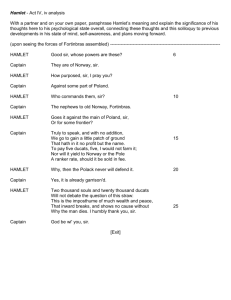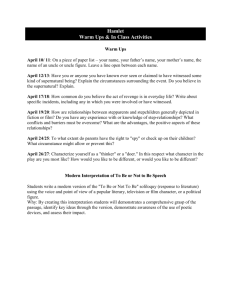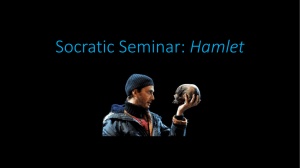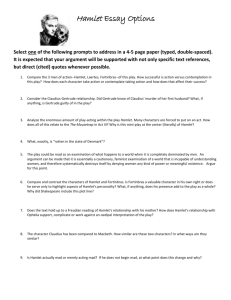Hamlet (From Q2, 1604-05)
advertisement
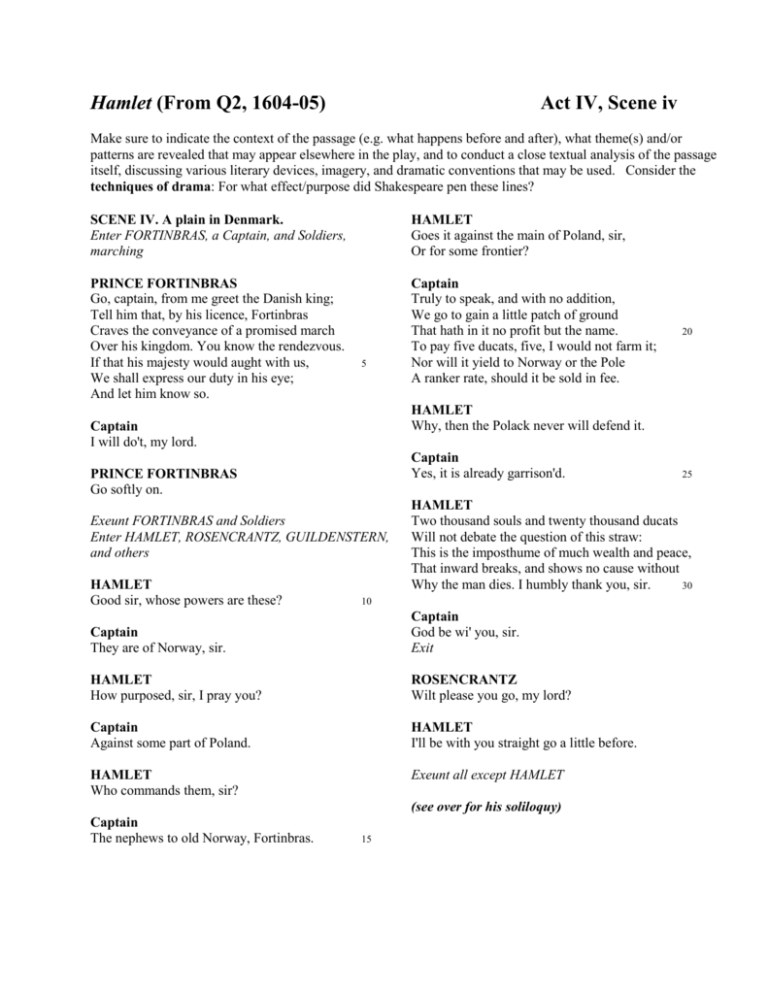
Hamlet (From Q2, 1604-05) Act IV, Scene iv Make sure to indicate the context of the passage (e.g. what happens before and after), what theme(s) and/or patterns are revealed that may appear elsewhere in the play, and to conduct a close textual analysis of the passage itself, discussing various literary devices, imagery, and dramatic conventions that may be used. Consider the techniques of drama: For what effect/purpose did Shakespeare pen these lines? SCENE IV. A plain in Denmark. Enter FORTINBRAS, a Captain, and Soldiers, marching HAMLET Goes it against the main of Poland, sir, Or for some frontier? PRINCE FORTINBRAS Go, captain, from me greet the Danish king; Tell him that, by his licence, Fortinbras Craves the conveyance of a promised march Over his kingdom. You know the rendezvous. If that his majesty would aught with us, We shall express our duty in his eye; And let him know so. Captain Truly to speak, and with no addition, We go to gain a little patch of ground That hath in it no profit but the name. To pay five ducats, five, I would not farm it; Nor will it yield to Norway or the Pole A ranker rate, should it be sold in fee. 5 HAMLET Why, then the Polack never will defend it. Captain I will do't, my lord. Captain Yes, it is already garrison'd. PRINCE FORTINBRAS Go softly on. Exeunt FORTINBRAS and Soldiers Enter HAMLET, ROSENCRANTZ, GUILDENSTERN, and others HAMLET Good sir, whose powers are these? 10 Captain God be wi' you, sir. Exit HAMLET How purposed, sir, I pray you? ROSENCRANTZ Wilt please you go, my lord? Captain Against some part of Poland. HAMLET I'll be with you straight go a little before. HAMLET Who commands them, sir? Exeunt all except HAMLET (see over for his soliloquy) 15 25 HAMLET Two thousand souls and twenty thousand ducats Will not debate the question of this straw: This is the imposthume of much wealth and peace, That inward breaks, and shows no cause without Why the man dies. I humbly thank you, sir. 30 Captain They are of Norway, sir. Captain The nephews to old Norway, Fortinbras. 20 How all occasions do inform against me, And spur my dull revenge! What is a man, 35 If his chief good and market of his time Be but to sleep and feed? a beast, no more. Sure, he that made us with such large discourse, Looking before and after, gave us not That capability and god-like reason 40 To fust in us unused. Now, whether it be Bestial oblivion, or some craven scruple Of thinking too precisely on the event, A thought which, quarter'd, hath but one part wisdom And ever three parts coward, I do not know 45 Why yet I live to say 'This thing's to do;' Sith I have cause and will and strength and means To do't. Examples gross as earth exhort me: Witness this army of such mass and charge Led by a delicate and tender prince, 50 Whose spirit with divine ambition puff'd Makes mouths at the invisible event, Exposing what is mortal and unsure To all that fortune, death and danger dare, Even for an egg-shell. Rightly to be great Is not to stir without great argument, But greatly to find quarrel in a straw When honour's at the stake. How stand I then, That have a father kill'd, a mother stain'd, Excitements of my reason and my blood, And let all sleep? while, to my shame, I see The imminent death of twenty thousand men, That, for a fantasy and trick of fame, Go to their graves like beds, fight for a plot Whereon the numbers cannot try the cause, Which is not tomb enough and continent To hide the slain? O, from this time forth, My thoughts be bloody, or be nothing worth! 55 60 65 Exit Analysis: What theme is reinforced here? What does the Fortinbras’s Captain mean when he says “We go to gain a little patch of ground / That hath in it no profit but the name” (19-20)? How do Fortinbras’s and Hamlet’s situations compare and/or differ? Hamlet makes claims as to what he wants to do. Have we seen this behaviour in Hamlet before? What was the outcome?
